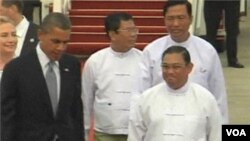Barack Obama is the first U.S. president to visit Burma. It is part of a trip to Asia meant to reinforce Washington's so-called "Asia pivot" which has raised concerns in Beijing about greater U.S. influence in the region.
U.S. officials say the president's visit recognizes the decision by Burmese leaders to embark on a path of reform and democratization after decades of repression.
Tom Donilon, Obama's national security advisor, says the president believes engagement is the best way to encourage further reforms.
"There’s a lot more to be done, and we are not going to miss this moment in terms of our opportunity to push this along and to try to lock in as much reform and lock in this path forward as best we can," he said.
Donilon says the United States is encouraging Burmese authorities to collaborate further with both the international community and domestic civil society. It is part of what the Obama administration calls a "rebalancing toward the Asia-Pacific" - a move toward greater U.S. military, diplomatic, and commercial presence in Asia that has caused anxiety in China.
"The idea is to persuade the Chinese that the American rebalancing is good for China," said Michael Pillsbury, a senior fellow at the Hudson Institute who worked for former Presidents Ronald Reagan and George Herbert Walker Bush.
He says Chinese leaders see the Burma visit as further evidence of U.S. deception about the aims of its Asia pivot.
"The U.S. is portrayed basically to Chinese youth and to Chinese university students and I am afraid to Chinese officials as a very crafty, dangerous, highly-coordinated, ruthless, cunning power that in many ways China would like to emulate," he added.
"Every move the American government is taking, including Obama's visit to Burma is now clearly taken as a geo-strategic move," said professor Xiang Lanxin, who chairs international affairs studies at Shanghai's Fudan University. "It is not something promoting Myanmar democracy. That's not even the issue here. The issue is to wean Myanmar, Burma away from the Chinese strategic borders. You keep on saying this has nothing to do with China. But the Chinese exactly think everything has to do with China. You keep on using this kind of language to try to reduce the psychological burden on the China side. It's not working."
Michael Pillsbury says China's view of President Obama's trip to Burma shows how much the Asia pivot has roiled relations between Washington and Beijing.
"What I think both Professor Xiang and I are trying to convey is the idea of two sides with some degree of distrust, even paranoia, each focusing on events and activities that may in fact be innocent but no one quite knowing," he said.
U.S. officials say they have discussed with their Chinese counterparts the reforms they would like to see in Burma and believe it is a shared goal that is in the interests of everyone in the region.
U.S. officials say the president's visit recognizes the decision by Burmese leaders to embark on a path of reform and democratization after decades of repression.
Tom Donilon, Obama's national security advisor, says the president believes engagement is the best way to encourage further reforms.
"There’s a lot more to be done, and we are not going to miss this moment in terms of our opportunity to push this along and to try to lock in as much reform and lock in this path forward as best we can," he said.
Donilon says the United States is encouraging Burmese authorities to collaborate further with both the international community and domestic civil society. It is part of what the Obama administration calls a "rebalancing toward the Asia-Pacific" - a move toward greater U.S. military, diplomatic, and commercial presence in Asia that has caused anxiety in China.
"The idea is to persuade the Chinese that the American rebalancing is good for China," said Michael Pillsbury, a senior fellow at the Hudson Institute who worked for former Presidents Ronald Reagan and George Herbert Walker Bush.
He says Chinese leaders see the Burma visit as further evidence of U.S. deception about the aims of its Asia pivot.
"The U.S. is portrayed basically to Chinese youth and to Chinese university students and I am afraid to Chinese officials as a very crafty, dangerous, highly-coordinated, ruthless, cunning power that in many ways China would like to emulate," he added.
"Every move the American government is taking, including Obama's visit to Burma is now clearly taken as a geo-strategic move," said professor Xiang Lanxin, who chairs international affairs studies at Shanghai's Fudan University. "It is not something promoting Myanmar democracy. That's not even the issue here. The issue is to wean Myanmar, Burma away from the Chinese strategic borders. You keep on saying this has nothing to do with China. But the Chinese exactly think everything has to do with China. You keep on using this kind of language to try to reduce the psychological burden on the China side. It's not working."
Michael Pillsbury says China's view of President Obama's trip to Burma shows how much the Asia pivot has roiled relations between Washington and Beijing.
"What I think both Professor Xiang and I are trying to convey is the idea of two sides with some degree of distrust, even paranoia, each focusing on events and activities that may in fact be innocent but no one quite knowing," he said.
U.S. officials say they have discussed with their Chinese counterparts the reforms they would like to see in Burma and believe it is a shared goal that is in the interests of everyone in the region.




